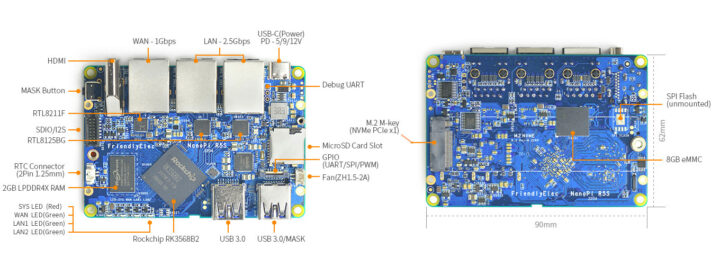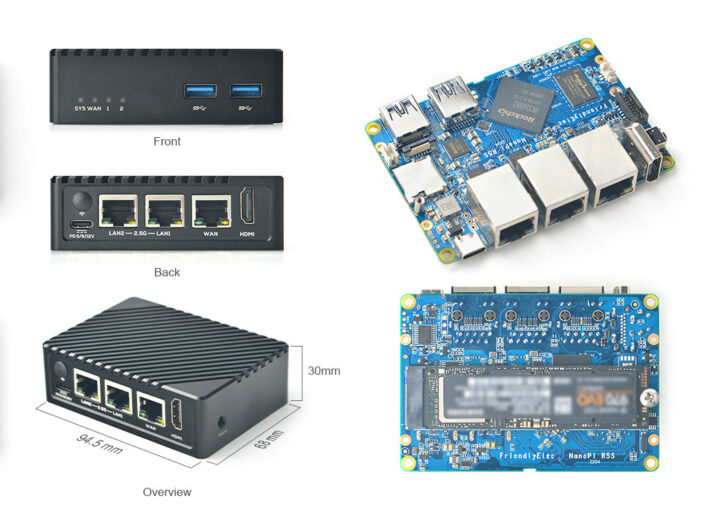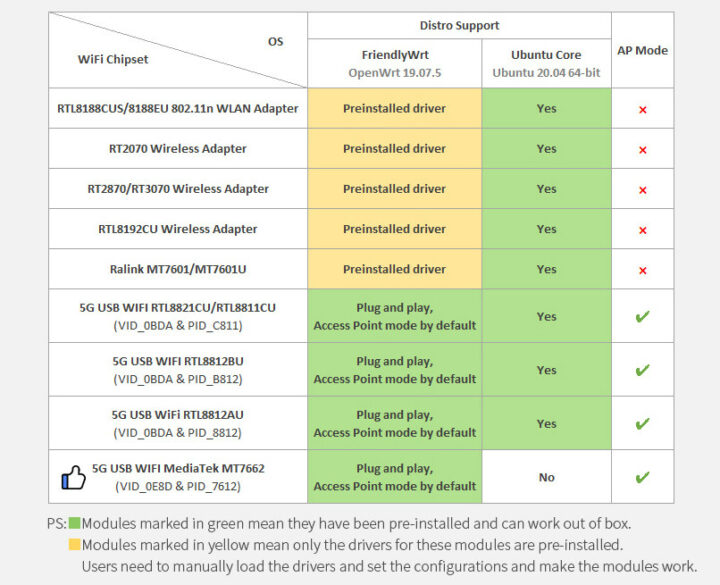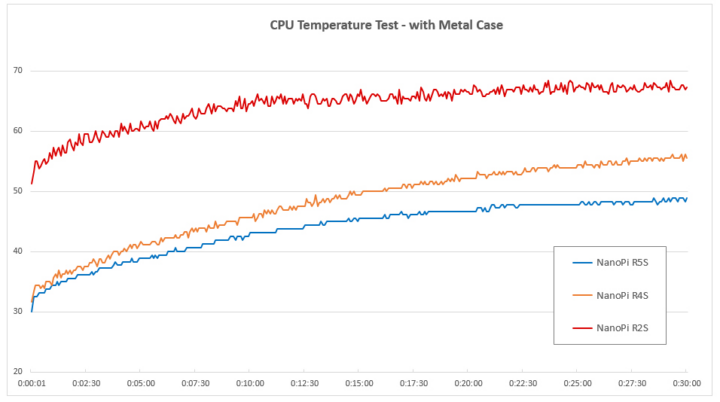The Rockchip RK3568-powered NanoPi R5S SBC with two 2.5GbE ports, one Gigabit Ethernet port, and M.2 NVMe storage is now available for $59, or $75 with a metal enclosure.
As previously mentioned, the mini router board is equipped with 2GB RAM, 8GB eMMC flash, two USB 3.0 ports, as well as an HDMI output for people wanting to make use of the Rockchip RK3568 processor’s multimedia capabilities, or simply have a user interface on a monitor.
NanoPi R5S specifications:
- SoC – Rockchip RK3568 quad-core Cortex-A55 processor @ up to 2.0 GHz with Arm Mali-G52 MP2 GPU, 0.8 TOPS AI accelerator, 4Kp60 H.265/H.264/VP9 video decoder, 1080p60 H.264/H.265 video encoder
- System Memory – 2GB LPDDR4X
- Storage
- 8GB eMMC flash for OS
- Key M socket for M.2 2280 (PCIe 2.0 x1) NVMe SSD support
- Optional SPI flash for network boot
- MicroSD card socket
- Video Output – 1x HDMI 2.0 port up to 4Kp60, or 1080p120
- Networking
- LAN – 2x 2.5GbE RJ45 ports (via 2x Realtek RTL8125BG PCIe controller) tested up to 2.35 Gbps (Rx) and 1.85 Gbps (Tx)
- WAN – 1x Gigabit Ethernet RJ45 port (via Realtek RTL8211F) tested up to 941 Mbps (Tx and Rx)
- USB – 2x USB 3.0 ports
- Expansion
- 16-pin 1.27mm pitch GPIO connector with 1x SD 3.0, 1x I2S (2x SDO, 3x SDI)
- 12-pin 0.5mm pitch FPC connector with up to 1x SPI, 3x UART, 4x PWM, 8x GPIO
- Debugging – 3-pin UART header
- Misc – Mask key for eMMC flash update, RTC battery connector, 5V fan header, 4x user LEDs
- Power Supply – 5V/9V/12V USB Type-C port (USB PD support)
- Dimensions – PCB: 90 x 62 mm; enclosure: 94.5 x 68 x 30 mm
- Weight – 57.5 grams without the case, 260 grams with the metal enclosure
- Temperature Range – 0 to 70
 We did not have information about software support last time around, but now we do with the company providing FriendlyWrt 22.03 (64-bit) and FriendlyCore Focal Lite images based on OpenWrt 22.03 and Ubuntu 20.04 respectively, but featuring Linux 5.10 LTS and U-boot 2017.09. The company also highlights support for Docker, notably showing instructions to install Jellyfin multimedia applications. You’ll find additional technical documentation in the Wiki.
We did not have information about software support last time around, but now we do with the company providing FriendlyWrt 22.03 (64-bit) and FriendlyCore Focal Lite images based on OpenWrt 22.03 and Ubuntu 20.04 respectively, but featuring Linux 5.10 LTS and U-boot 2017.09. The company also highlights support for Docker, notably showing instructions to install Jellyfin multimedia applications. You’ll find additional technical documentation in the Wiki.
FriendlyElec does not typically include WiFi in their router boards, and instead relies on customers making use of USB WiFi dongles some of which can be used as access points.
The NanoPi R5S offers an upgrade path to either NanoPi R2S (Rockchip RK3328 quad-core Corex-A53) or NanoPi R4S (Rockchip RK3399 hexa-core Cortex-A72/A53) devices, and one consequence of using Cortex-A55 cores is that the RK3568 mini router operates more efficiently and with the metal enclosure, the CPU temperature never exceeds 50°C based on measurements made by FriendlyElec.
I’ll soon be able to test all that myself, as I’m expecting a package from DHL with two boards and enclosures later today.

Jean-Luc started CNX Software in 2010 as a part-time endeavor, before quitting his job as a software engineering manager, and starting to write daily news, and reviews full time later in 2011.
Support CNX Software! Donate via cryptocurrencies, become a Patron on Patreon, or purchase goods on Amazon or Aliexpress







